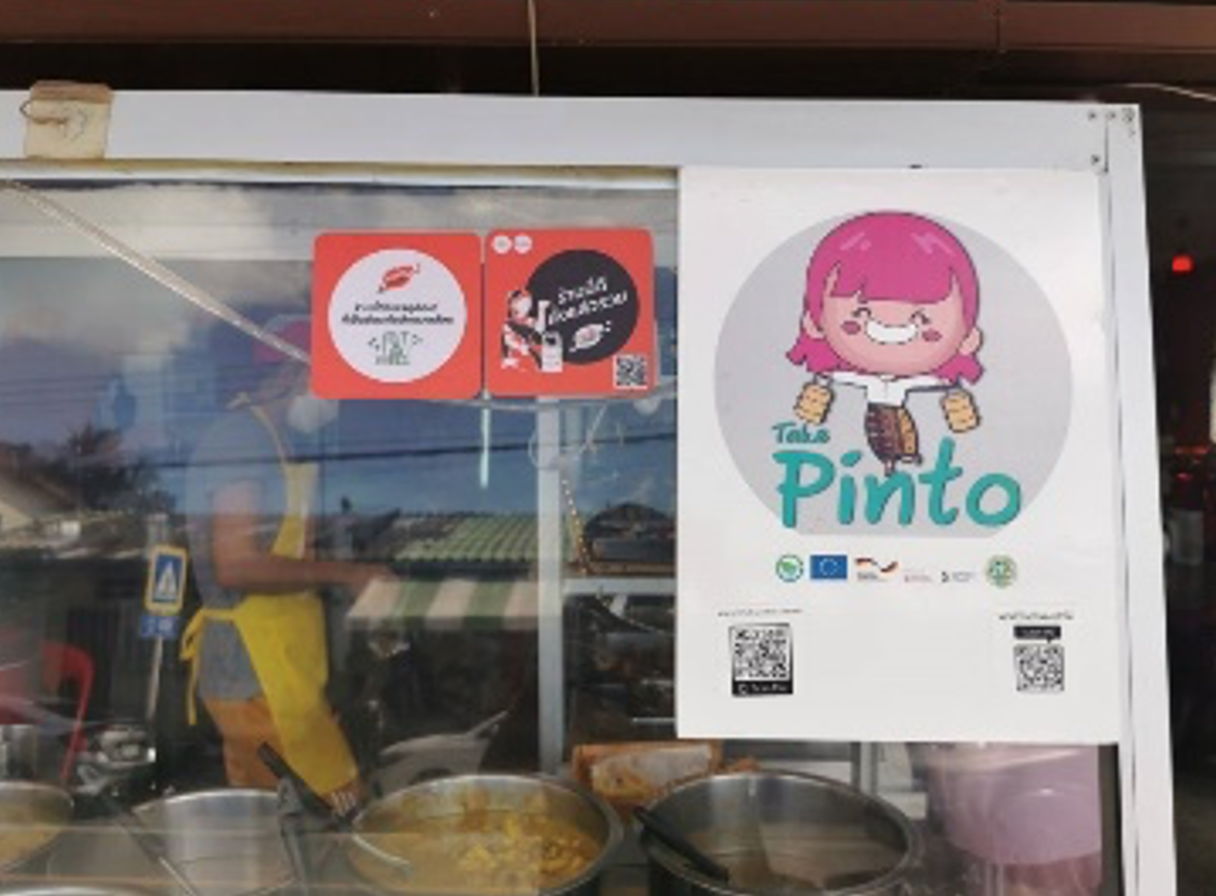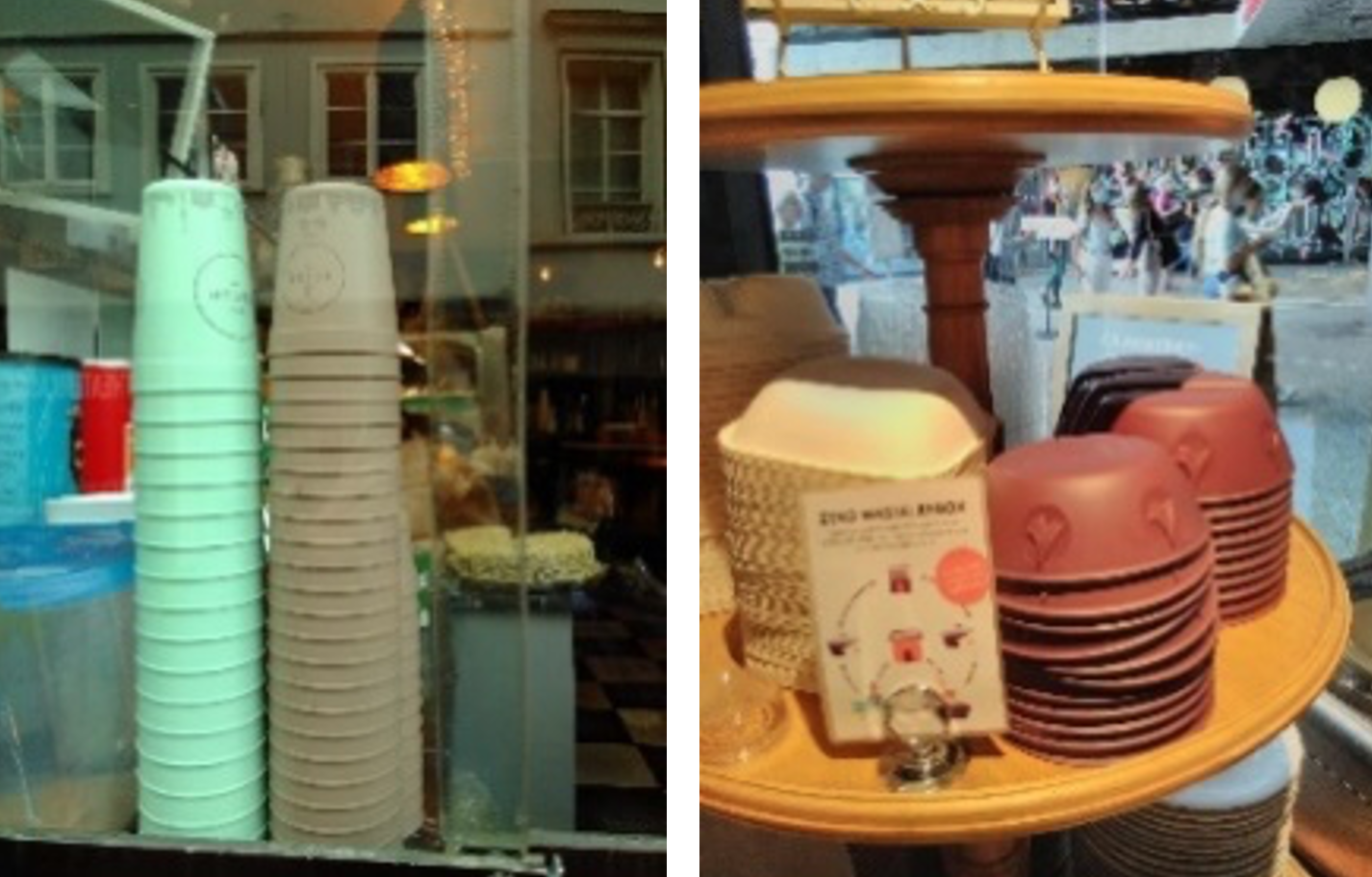Food delivery and takeaway are on the rise – accompanied by growing amounts of single-use plastic waste. COVID-19 related restrictions for restaurants and cafés have further contributed to this trend. How to switch to reusable packaging to prevent waste and environmental pollution? A new guide gives ideas for businesses and recommendations for policymakers, based on examples from Asia and Europe. It was prepared by GIZ with support from the TUEWAS Innovation Fund and is now available. In addition, pilot activities to reduce plastic waste are currently on-going in China, Indonesia, Malaysia, Philippines and Thailand. Their experiences can be found here.
Food delivery and takeaway are on the rise in urban areas across Asia – a trend further amplified by the COVID-19 related physical distancing measures for restaurants, cafés and other dine-in gastronomy businesses. Typical orders of meals and drinks are accompanied by single-use plastic food containers, cups, cutlery, straws, sauce packages and bags.
The associated plastic waste often ends up at dumpsites and landfills, pollutes the air through open burning or is littered on streets and coastlines, congesting drainage systems or leaking into rivers and the ocean. Public policies in Asia and Europe increasingly pay attention to the issue and seek to reduce or phase out certain single-use plastic products.
Promoting reusable packaging has emerged as a key strategy in this context. If reused enough times, multi-use food and beverage containers, cutlery, straws and bags usually have lower environmental impacts along their life cycle than single-use materials. It can also contribute to savings in material costs for restaurants and takeaway vendors.
A new guide on how to promote reusable packaging, developed by GIZ, now outlines approaches and shows best practices. It gives ideas to businesses such restaurants, takeaway vendors, stores and online food delivery platforms. It also provides recommendations to policymakers. The guide was prepared by several GIZ projects with support of the TUEWAS Innovation Fund.
It is aligned with rapid business innovation that can be observed in the sector. Reuse network operators are emerging as start-up companies, which offer reusable packaging solutions across several restaurants and vendors, thereby facilitating take-back cycles. They innovate in terms of reusable packaging design (stable, stackable, washable, recyclable, etc.), business models (subscriptions by vendors and/or individuals), bring-back incentives(deposit-refund, IT-based solutions with smartphone applications), as well as publicity and partnerships (e.g. cooperation with food delivery platforms and local governments, interactive maps to find participating restaurants). They also promote hygiene standards and contribute to monitoring.
Policy innovations are also taking place. For instance, the Thai Ministry of Natural Resources and Environment has made a voluntary agreement with food delivery platforms to reduce single-use plastics – contributing to the Thai Roadmap and Action Plan on plastics. The Indonesian Ministry of Environment and Forestry has set requirements for food and beverage service businesses to plan, implement and report single-use plastic reduction as part of its Roadmap to Waste Reduction by Producers. The Chinese Opinions on Further Strengthening the Treatment of Plastic Pollution envisage greener logistics in food and express delivery and include intended bans for certain single-use plastics.
The European Union has banned certain single-use plastic items such as plates, straws, cutlery and Styrofoam food containers, in effect since July 2021. Germany bans single-use plastic carrier bags (15-50 microns) by January 2022 and introduced the obligation for takeaway and food delivery businesses to offer reusable options to customers at a price not more expensive than single-use – starting in January 2023. The ASEAN Regional Action Plan for Combating Marine Debris also includes measures to address single-use plastics.
In this context, several organisations implement pilot activities with support from GIZ’s “Rethinking Plastics” and “CAP SEA” projects and its commissioning parties, among them the German Government and the European Union. In Thailand, the Phuket Environmental Foundation is testing a “Take Pinto” campaign with around 15 restaurants and takeaway vendors to switch to reusable “pinto” boxes. It also includes a community-based delivery application, developed by a team of Chulalongkorn University to improve the conditions for drivers and restaurants. The Philippine Reef and Rainforest Conservation Foundation supports with its “Wala Usik” project 11 restaurants, food stalls, eateries and sari-sari stores in Bacolod and Talisay Cities with advice on single-use plastic alternatives and business development. It has also conducted a circular economy idea competition for start-ups across the country.
The Indonesian Plastic Bag Diet Movement works with traditional markets in Bandung and Banjarmasin cities to switch to reusable carrier bags. It reaches out to market traders and customers and develops approaches for behavioural change. In Malaysia, the start-up venture TAPAUWARE is undergoing an incubation phase for offering reusable packaging to restaurants and takeaway vendors in Shah Alam city. In China, the Shenzhen Universityteams up with the JD Company and the China Federation of Logistics and Purchasing to promote reusable boxes and bags in express delivery in Haikou City, Hainan Province.
Regional knowledge exchange and cooperation in addressing land-based solid waste leakage in ASEAN, including the issue of single-use plastic waste will be fostered by GIZ’s “3RproMar (Reduce, Reuse, Recycle to Protect the Marine Environment)” project, and all relevant projects in the region that cover the issue are welcome to contribute. The international PREVENT Waste Alliance, whose secretariat is based at GIZ, has created a sub working group on reusable packaging with upcoming pilot activities. It also documents and analyses the experiences of various organisations and contributes to refining approaches for promoting reusable packaging.
Contact person:
Pascal Renaud and Lena Kampe, Advisors, Rethinking Plastics – Circular Economy Solutions to Marine Litter, renaud@giz.de, lena.kampe@giz.de
- Links:
- Download link of Guide (we would add it later after final review of the layout)
- Rethinking Plastics – Circular Economy Solutions to Marine Litter https://beatplasticpollution.eu/rethinking-plastics/
- Collaborative Action for Single-Use Plastic Prevention in South-East Asia (CAP-SEA) https://www.thai-german-cooperation.info/en_US/the-collaborative-actions-for-single-use-plastic-prevention-in-south-east-asia-cap-sea/
- China Integrated Waste Management NAMA https://www.iwm-nama.org/
- Reduce, Reuse, Recycle to Protect the Marine Environment and Coral Reefs (3RproMar) https://tuewas-asia.org/project/reduce-reuse-recycle-to-protect-the-marine-environment-and-coral-reefs/
- PREVENT Waste Alliance https://prevent-waste.net/en
- Key buzzwords: plastic, marine litter, circular economy, waste, food delivery, COVID-19, green recovery, sustainable consumption and production



